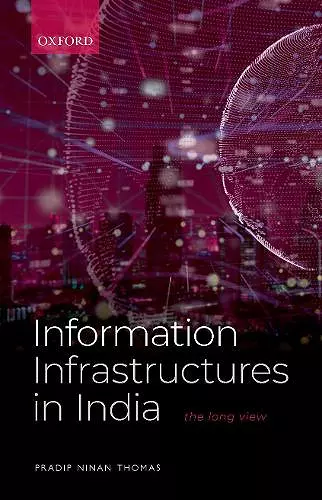Information Infrastructures in India
The Long View
Format:Hardback
Publisher:Oxford University Press
Published:23rd Aug '22
Currently unavailable, and unfortunately no date known when it will be back

This book explores the past and present of information infrastructures in India. Grounded in infrastructure theory, it explores the historical continuities between information infrastructures in colonial and post-colonial India and the compulsions of information infrastructures in contemporary India. This volume highlights the roles played by private and public sector entities in shaping information infrastructures in India, the political economy of growth in this sector and the challenges faced by the State in regulating information platforms that are also information infrastructures. It includes separate chapters on oceanic cable infrastructures that account for more than 90 per cent of data traffic between India and the rest of the world and the political economy of India's satellite program. Taking the 'long view', it argues that the provisionings of information infrastructures are by no means straight forward, that they are always expressions that are shaped by internal and external contestations, by ideological ends and business imperatives, the needs of consumers/citizens and the State, that there is a politics of infrastructure that needs to be accounted for, and that there always are winners and losers in large infrastructural projects such as Digital India.
Information Infrastructures in India untangles the tangled histories of infrastructure in the country, from the colonial railway and the telegraph to the post-colonial modernization projects, including satellite broadcasting and the much-hyped Digital India initiatives. Drawing from an impressive array of theoretical frameworks from critical media studies, techno-policy studies, and anthropological perspectives on the state, Pradip Thomas, one of the leading scholars of the political economy of media and communication in India, urges the reader to understand the contemporary digital approach to nation-building in India as the latest phase in the evolution of information infrastructures that are intricately tied up with neoliberal economics, the surveillance state, and exclusionary social hierarchies. Vinod Pavarala, Senior Professor of Communication & UNESCO Chair on Community Media, University of Hyderabad, India
Pradip Thomas has been one of the most consistent, incisive and original thinkers about communications and media developments, trends and histories in the Global South for years. This new book continues in that vein. In it, Thomas deftly weaves together the historical intersections between communications infrastructure (e.g. telegraphs) and media (e.g. broadcasting) in India from the British imperial era through to the sweeping developments that are taking place now. His treatment of both eras is panoramic. Later chapters in this book explores the infrastructure of oceanic cables and satellite networks and the infrastructure anxieties faced by India. It highlights the fact that the India government is becoming more and more dependent on a relatively small number of privately-owned, for profit global digital platforms to meet the needs of the citizens and society they are supposed to serve and represent. Dwayne Winseck, Professor, School of Journalism and Communication
In Information Infrastructures, Pradip Thomas sets his attention here to the multi-layered material history of media in India, detailing the imperial visions and national achievements, along with the political contestations, social fissures and inevitable shortfalls that have arisen with each wave of media technologies. Firmly grounding media systems in their material conditions, social responsibilities and political compromises, Thomas expertly weaves together a narrative from the days of the Company and the telegraph to the consecration of Digital India and the rise of Reliance Jio. In each era, Thomas excavates the hubris and anxieties of the state, the national and international impetus of media economy, and the aspirations and ingenuity of India's people. Adrian Athique, A.Prof., School of Communication and Arts, University of Queensland
ISBN: 9780192857736
Dimensions: 223mm x 145mm x 14mm
Weight: 358g
182 pages